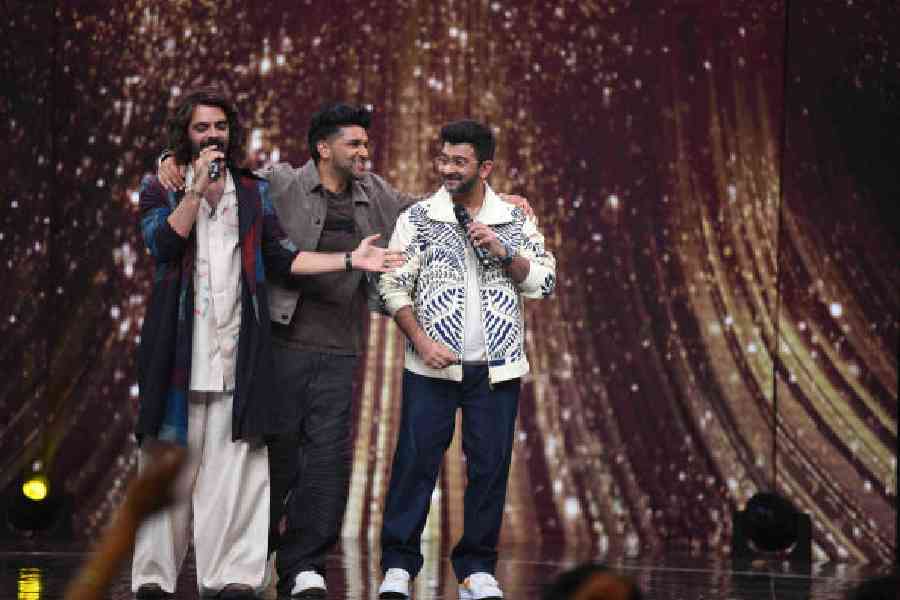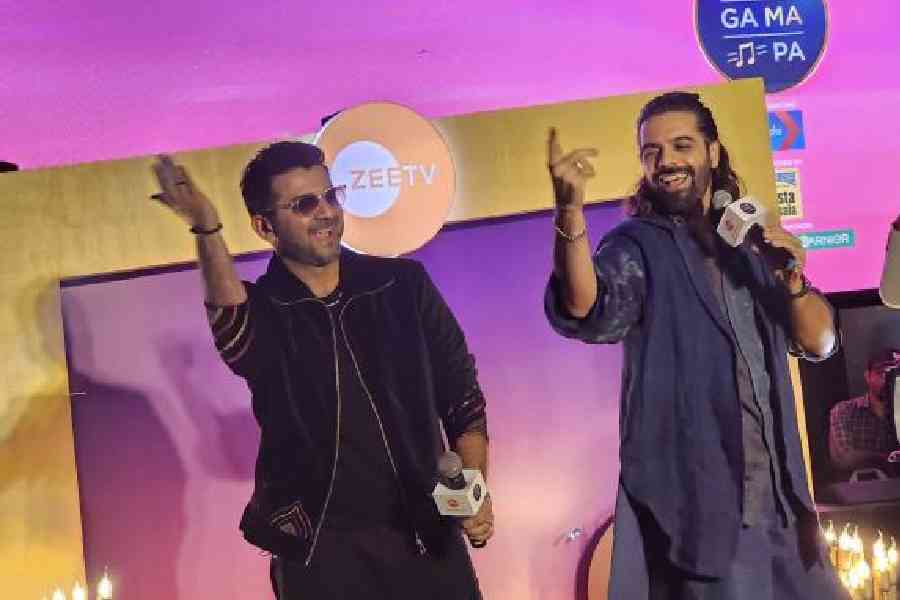My fondest memory of Calcutta is phuchka. I can die for that,” Sachin Sanghvi voyages down memory lane to the time when he would take a boat ride from Babughat and then have phuchka at Millennium Park during his visits to the city. “It would seem time had stopped when we passed under the Howrah bridge,” he smiles, turning towards Jigar Saraiya.
The Sachin-Jigar duo which has given us hits like Apna bana le from Bhediya and Tere vaaste from Zara Hatke Zara Bachke and, most recently, Stree 2, has debuted as judges in the singing contest Sa Re Ga Ma Pa, beaming every weekend at 9pm on Zee TV. They chatted with t2 before an informal gig at Shiloh, a nightclub in Mumbai.
You have a deep connection with Pritam.
Jigar: Yes, Pritamda is like a guru to us. We were with him from mid-2006 to 2010. He gave us different jobs. Sometimes he would send us to dub a singer, sometimes I would be going to a programmer and Sachin would be dubbing a musician. Sometimes both would be going for a mixing session. He taught us so much about music. We will always be in his debt.
Sachin: There was so much music happening in his camp at that point that he had to trust us and delegate work. We represented the camp in some places. That helped us in learning not only music production but also people management. The job is not only composing songs but also dealing with producers, directors….
He is the kindest person we know. He treats us like kids. Some days ago, he came to our studio and it was the most gratifying moment for us. We are vegetarians. But we learnt about machh bhaat from him. He has a special way of eating bhelpuri. He calls it kurkura. If there is one thing we can do all over again, we would go back to his studio and work.
Jigar: Yes, in the blink of an eye. (Smiles)
You thanked him on stage when accepting the Zee Cine Award for Bhediya last year.
Sachin: Yes, what can be better than accepting our first major award in front of our guru? It was a special moment for us.

Sachin Sanghvi and Jigar Saraiya on the sets of Zee TV's Sa Re Ga Ma Pa with fellow mentor Guru Randhawa
You have worked with other composers like A.R. Rahman and Rajesh Roshan.
Sachin: Rajesh Roshan has such a calm personality.
Jigar: We were with Raju bhai from 2002 to 2006. We learnt how to connect cables, how to play the keyboard and how to make a namkeen tune, that is, a populist tune. He told us we have to learn how to programme music. He had that foresight in 2002. That is one of our biggest strengths today. We can pick up a tune and make 10 versions of it because we can produce our own music, without depending on anyone else.
You also met Anu Malik.
Jigar: That was much later. Anuji, Sandesh Sandilyaji, Jatin-Lalit sir...
Sachin: ...A.R. Rahman sir. That was a dream come true. If I am in music, it is because he was Dronacharya to my Ekalavya. I leant from every album of his that came out.
Which album did you assist him on?
Sachin: It was a song called Hosanna. I forget the film. (Ekk Deewana Tha) It was a remake of a South Indian film. He is no less than God for us.
Jigar: A friend worked with Rahman sir. He introduced us and got us to do the job for him. We spoke to him on Zoom and programmed a lot of stuff for the song.
Sachin: We met him later in Dubai where he was doing the music at the expo. Now we can go up to him and speak, though he doesn’t speak much.
You also worked with other big music composers.
Sachin: All these maestros have their own mark in the industry. They have had their own struggles and journeys. Jatin-Lalit have their own style. Anu Malik sir was a go-getter. All of them have different perspective to a love song. As assistants, we had a full view of Bollywood, how each composer approached a song.
How did the two of you meet?
Sachin: We met through Amit Trivedi. Amit and I used to do shows together in a small band. I used to work for television. I needed somebody to share the workload. I asked Amit if he knew a Gujarati boy who could come to my house and work with me. I had a home studio then. Jigar’s dad was a friend of Rajesh Roshanji. At that time Jigar and Amit were assisting Rajesh Roshanji. We bonded over a lot other than music — culture, food... kuchh log jeene ke kiye khaate hai, hum khaane ke liye jeete hai. (Laughs) I was doing my CA, he was fresh out of college, doing his MBA. As Gujaratis, there was no real seriousness about music.
Jigar: We partner each other in skill sets. We even complete each other’s sentences. There is too much trust. Rab ne bana di jodi. (Laughs)
How excited are you about your TV debut in a music contest?
Jigar: Making our debut on TV is not our high. Our high is we might be able to give somebody the kind of guidance that Pritamda and Rajesh Roshanji gave us. The Sa Re Ga Ma Pa team has gone to the grassroots in search of talent. The kind of talent they have got now places the responsibility on us to groom them. We are not there to judge them. We will build on their strengths and correct weaknesses. If their voice suits a certain song we will give them songs.
Sachin: If their voice suits the stage we want to build their personality to go on to become rockstars. Today social media is your playground. Sitting in one corner of the country, you can become famous in 15 seconds. We don’t limit talent to Bollywood opportunities. If their talent is meant for the stage, for social media sort of singing… we want to mentor them based on that. That’s our biggest mojo of being on the show.
Earlier the talk in such shows centred around who would get the first Bollywood break...
Jigar: I don’t think Bollywood is the only medium of making music. Now we all have mobile phones. Indie music is growing in India. Instagram or any social media is your tool. If you have the talent and the right grooming, you can go beyond Bollywood without Bollywood.
Tell us about the contestants.
Jigar: Had the talent been any less than amazing we would have asked them to scout some more. But we have some great voices, both trained and raw singers.
Sachin: In the new edition of Sa Re Ga Ma Pa, you are not going to see just singers. These kids are performers also. They know how to dress up, use the stage, woo an audience....
Jigar: Sa Re Ga Ma Pa has updated itself with the times so a contestant coming on the stage stays relevant to the real world.
Sachin: That is why the mentor panel is a fresh one as we are dealing with new kinds of talent.
Jigar: We want their experience to be the start, not an end in itself.
How seriously do you take yourselves as singers?
Sachin: I have learnt classical (music) rigorously for nine years. I wanted to become Kumar Sanu. Then Roja happened to me and I wanted to be nothing but a music composer. Waise singer banne ka riyaz ab nahin raha but we are working 20 hours a day. So riyaz ho jata hai. Coming up with new tunes every day is too much for us to be content with only singing. We are happy as composers.
Do you agree with Rahman that the singer’s voice is just one of the instruments in a song?
Jigar: Yes. Voice is the lead instrument. What’s better than being the lead instrument of the song? Making the song!
You have been through the ages when one could buy a cassette or a vinyl record or a CD. Do you miss being able to hold your album?
Jigar: No. My friends and I used to run a Rahman fan club. We would contribute ₹50 each and buy a CD. Each would get to keep the disc one day of the week. We have lived that life. But there are pros and cons. My 17-year-old daughter is listening to Yugoslavian music. They get access to so many kinds of music through one annual subscription. Of course, that sense of music ownership is not there. A lot of information is coming to the kids. The way music is consumed is evolving, we have to match up to the pace as creators. Do I miss those CD-buying days? Yes, I do. Do I have a wider audience today? Yes, I do.











